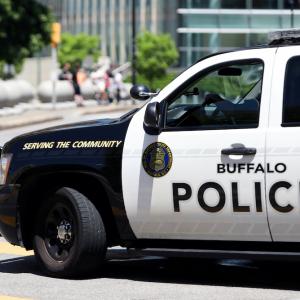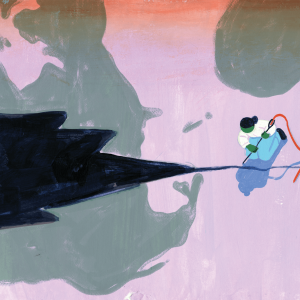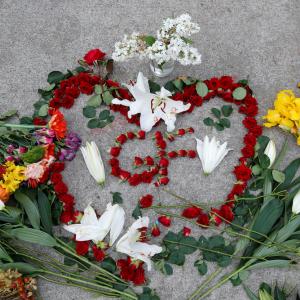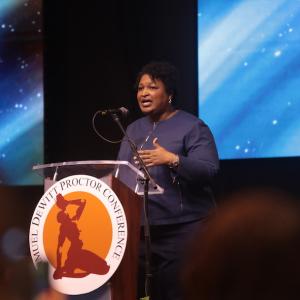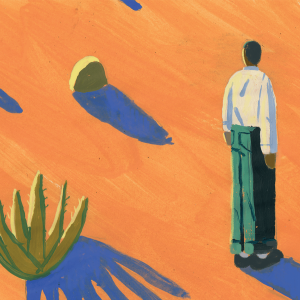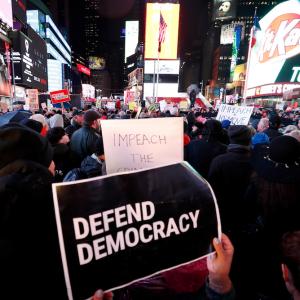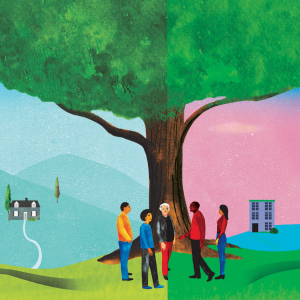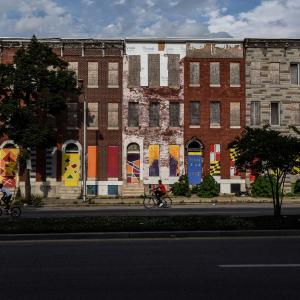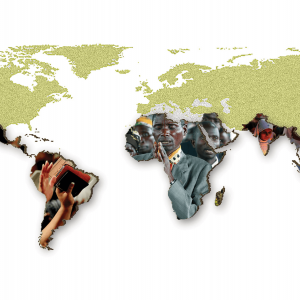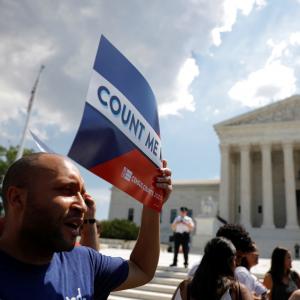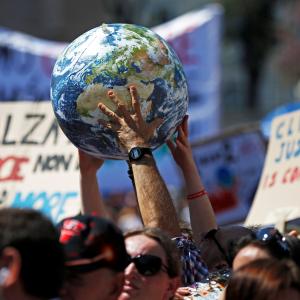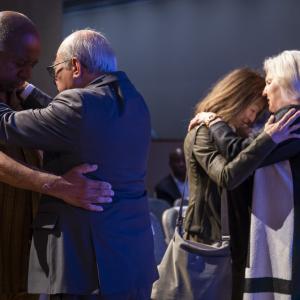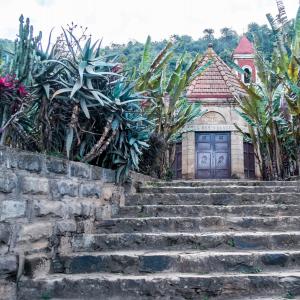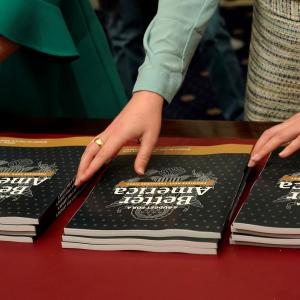
Rev. Adam Russell Taylor is president of Sojourners and author of A More Perfect Union: A New Vision for Building the Beloved Community. Follow him on Bluesky @revadamtaylor.
Taylor previously led the Faith Initiative at the World Bank Group and served as the vice president in charge of Advocacy at World Vision U.S. and the senior political director at Sojourners. He has also served as the executive director of Global Justice, an organization that educates and mobilizes students around global human rights and economic justice. He was selected for the 2009/2010 class of White House Fellows and served in the White House Office of Cabinet Affairs and Public Engagement. Taylor is a graduate of Emory University, the Harvard University Kennedy School of Government, and the Samuel DeWitt Proctor School of Theology. Taylor also serves on the Independent Sector Board, the Global Advisory Board of Tearfund UK, and is a member of the inaugural class of the Aspen Institute Civil Society Fellowship. Taylor is ordained in the American Baptist Church and the Progressive National Baptist Convention and serves in ministry at the Alfred Street Baptist Church in Alexandria, Va.
Speaking Topics
- Human rights and global poverty
- Racial justice
- Voting rights
- Climate justice
- Economic justice
- Immigration
- Peace and nonviolence
- His most recent book, A More Perfect Union: A New Vision for Building the Beloved Community
Speaking Format
- Virtual and in-person events, also available for preaching
Languages
- Fluent in English
Past Notable Events
- Tufts University’s Russell Lecture
- United Church of Christ General Synod Gathering Keynote
- Children’s Defense Fund Staff Retreat Keynote
- Parliament of the World Religions
- Christian Community Development Association Keynote Panel
Posts By This Author
‘A Change Is Gonna Come’: Reimagining Public Safety
Transforming our policing and reimagining public safety will require much more dialogue, bridge-building, and, ultimately, sustained public pressure.
Political Delay and Denial Has Always Been Deadly
COVID-19 presents us with a historic opportunity—and responsibility—to heal inequities.
AMERICA ENTERED THE COVID-19 crisis in a dangerously divided and polarized place, politically and culturally. But by embracing our interdependence, protecting the weakest members of our society, and showing equal concern for one another, we can emerge from this crisis more unified and committed to reimagining and rebuilding a radically more just and healthy nation and world.
This crisis has the potential to force us out of our selfish hyperindividualism; it instead calls us to demonstrate solidarity and love for our neighbor by protecting ourselves and others by sheltering at home and practicing physical distancing for as long as is deemed necessary for the sake of everyone.
Two decades ago, I preached my first sermon, which reflected upon 1 Corinthians 12 and spoke to the imperative to heal the global body from the HIV/AIDS pandemic, which at that time was ravaging the continent of Africa and felt insurmountable. I believed then that the AIDS crisis and our response to it would define my generation, just as the coronavirus will likely be a defining moment for a new generation. I believe there are lessons we can glean from the AIDS pandemic that can help us get through the current crisis.
The Church and the Bible Are Not Presidential Props
Last night, Donald Trump used and abused a church, and a Bible, as presidential props for a photo-op. In a violent and authoritarian act, the president of the United States took the space of a church and used a picture of a Bible to make a political move.
George Floyd Deserved to Breathe Free
I can’t breathe.
These were George Floyd’s desperate cries for help as he gasped for breath and clung to life due to the senseless brutality of four police officers in Minneapolis, one of whom, Derek Chauvin, had his knee and weight crushing Floyd’s neck.
A Test of Global Leadership
Amid COVID-19, Our Interconnectedness Has Never Been More Apparent
Nearly 20 years later, we must again push our government to expand global aid to fight the COVID-19 pandemic. As Christians, the moral imperative is clear. But in order to convince the powers at be, we must also argue that protecting the American economy and our national public health requires that we move from investing millions to investing billions — perhaps even trillions — in order to mount an adequate global response.
This Planet Can’t Breathe
The climate crisis increasingly poses an existential threat to all of us, and yet the impacts will disproportionately hurt the already marginalized.
IN 2018, CLIMATE SCIENTISTS reached a consensus that, based on current global emissions, we have roughly 12 years to dramatically reverse course before we cause irreparable harm to our planet and our way of life. These and other predictions cause me to lose sleep at night, particularly when I think about the world that my two sons will inherit.
But this alarming trend is not inevitable, nor are we powerless to change course. Preventing the worst consequences and putting the planet on a zero-carbon trajectory will require a revolution of social and political will. Catalyzing this revolution will require new language, new metaphors, and new messengers.
“I can’t breathe.” These were the prophetic words said by my pastor, Rev. Howard John-Wesley, in a sermon in which he made the case that we are on the brink of ecological destruction. He preached about the thousands of species that go extinct every year. He emphasized that Americans constitute 5 percent of the world’s population but burn 25 percent of the world’s fossil fuels. These and other trends of conspicuous consumption and abuse are driving us toward global catastrophe.
The Time to Act Like a Community Is Now
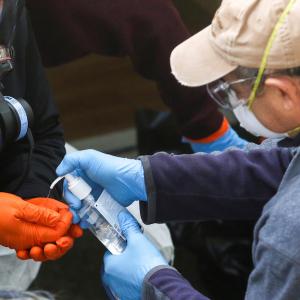
Members of a Servpro cleaning crew use hand sanitizer as they take off their protective gears and exit the Life Care Center of Kirkland, the Seattle-area nursing home at the epicenter of one of the biggest coronavirus outbreaks in the United States, in Kirkland, Wash., March 11, 2020. REUTERS/Jason Redmond
As I write this piece, my sons are not at school but home with me, because their elementary school decided to start Spring Break three days early to slow possible transmission of the virus and keep the community as safe as possible. While this has caused some inconvenience, I realize just how fortunate I am — I can work from home when needed and I have access to both sick leave and personal days. This is not the case for the majority of workers in the country. Congress will likely be voting soon on the Families First Coronavirus Response Act, which would provide urgently needed funding and provisions for free testing, three weeks of paid sick leave, unemployment insurance, supplemental food stamps, and nutritional support to kids who depend on school lunch. I’m hopeful and prayerful that the White House and Congress can transcend politics in this moment and pass this bill, because the virus knows no party and a bolder response is overdue.
Your Right to Vote: The Imago Dei Imperative
Voter suppression tactics jeopardize the very legitimacy of the 2020 election. They also represent an assault on human dignity and imago dei, because as Dr. Martin Luther King Jr. so aptly put it, “So long as I do not firmly and irrevocably possess the right to vote, I do not possess myself. I cannot make up my mind — it is made up for me. I cannot live as a democratic citizen, observing the laws I have helped to enact — I can only submit to the edict of others.”
When Your Nation Is Stuck in a Spiritual Desert
Facing political and spiritual deserts requires surrender to God.
LENT IS A season of introspection and reflection as we prepare for Easter. By observing the 40 days of Lent, we replicate Jesus’ sacrifice and withdrawal into the desert for 40 days.
When I was 16, my mom accepted a new job at the University of Arizona, and my parents made the untimely decision to uproot our family and move from the Pacific Northwest to the Arizona desert just before my last year in high school. As a result, I know something about deserts.
Deserts are not simply physical places—they are also spiritual and emotional seasons in our lives. What the physical desert does to the body, the spiritual desert does to our soul, making us feel drained and depleted. In moments of spiritual desert, we can feel disoriented and alienated from God. St. John of the Cross referred to these as dark nights of the soul—times when “we feel a spiritual drought and estrangement from God.”
Nations can also go through what feel like periods of desert. America seems stuck in a dire one now. The current political crisis represents a test of our democracy and of the witness of the church. U.S. Christianity is also facing desert times as younger Christians abandon the church in record numbers.
In Times of Crisis, Christians Must Seek and Act on the Truth
We can respect a diversity of Christian opinion around whether impeachment is the necessary and only remedy to the president’s actions and whether the president’s offenses rise to the constitutional level of "Treason, Bribery, or other high Crimes and Misdemeanors.” But what I can’t understand or respect are direct efforts to subvert the truth, deflect attention, and defend the indefensible.
We Need the Beloved Community Now More than Ever
In times of great polarization, we must look to moral visions that unite Americans around a bigger story of us.
THIS SUMMER, WHILE working on a forthcoming book, I spent a great deal of time thinking, praying, and wrestling with identifying a moral vision and narrative that would be capable of uniting our country and counteracting its perilous levels of polarization. When I look back over American history, “the beloved community” stands out as perhaps the most hopeful and transformational moral vision, one that I believe can be recast and reimagined to unite most Americans around a bigger story of us. The beloved community combines civic ideals with deep spiritual and religious values—that’s why it’s a vision that can resonate across religions and with those who check “none of the above” on religious-identification surveys.
The term was coined in the early days of the 20th century by the philosopher-theologian Josiah Royce. However, it was Martin Luther King Jr., as well as other leaders in the civil rights struggle, who popularized the term. Dr. King spoke about the beloved community in a 1956 speech he gave at a rally following the Supreme Court decision desegregating buses in Montgomery, Ala. King said, “the end is reconciliation; the end is redemption; the end is the creation of the beloved community. It is this type of spirit and this type of love that can transform opponents into friends. It is this type of goodwill that will transform the deep gloom of the old age into the exuberant gladness of the new age. It is this love which will bring about miracles in the hearts of [people].”
Why A 1949 Classic Is Required Reading in 2019
Howard Thurman offers a balm for the wounded soul of our nation.
Howard Thurman’s seminal and seemingly timeless book Jesus and the Disinherited, published in 1949, should be required reading in every seminary—maybe even in every church.
Thurman served as a moral anchor of the civil rights movement. His career spanned the breadth of the movement, from his tenure as a professor of religion at Morehouse College and his service as dean of Rankin Chapel at Howard University to pastoring the nation’s first multiracial, interfaith church, The Church for the Fellowship of All Peoples in San Francisco, and becoming the first black dean of Boston University’s chapel. A visionary religious leader and thinker, he was a guide and inspiration to Martin Luther King Jr., James Farmer, Marian Wright Edelman, Bayard Rustin, Jesse Jackson, and many others in the struggle for civil rights, justice, and freedom.
Thurman has also had a profound impact on my own faith journey, particularly in inspiring and sustaining my commitment to faith-rooted activism.
The Corrosive and Malignant Danger of Remaining Silent About Racism
While we shouldn’t be sucked into Trump’s sinister game of getting distracted by and responding to every outrageous and egregious tweet or statement, there is also a corrosive and malignant danger of remaining silent. If we are silent, the cancer of racism will become more and more acceptable and normalized, emboldening white nationalists and supremacists and leaving already vulnerable communities even more vulnerable.
Freeing the Church from American Nationalism
There is much we can learn from the global church.
MOST AMERICAN CHRISTIANS likely don’t know the degree to which the center of gravity of Christianity has shifted from the West to the global South. This reality has failed to penetrate the consciousness of most Christians in the U.S.—and our ecclesial imagination would be transformed if it did.
In the early years of Christianity, Paul wrote to what had already become a global church stretched across the vast reaches of the Roman Empire, from Rome to Corinth to Ephesus to Philippi and beyond. Paul’s epistles demonstrate his clear conviction that the health of the church in one place impacts the health of the church elsewhere or, as he puts it so poetically in 1 Corinthians 12, if one part of the body suffers, then all parts suffer with it.
Who's Most at Risk When the Census Is Politicized
The right to be counted is at the foundation of our faith and our democracy. In Matthew 18:12–14) and Luke (Luke 15:3–7) Jesus tells the iconic parable about the lost sheep. A man, who owns 100 sheep, goes to great lengths to find one missing sheep out of the 100 and when he finally recovers the lost sheep, he is happier about the one sheep that is found than the 99 who are safe. The parable speaks volumes about the degree to which God shows a particular concern and attention around anyone who is lost or falls in harm way. In a similar vein, we should be alarmed and equally committed when one person is miscounted or disregarded in our society. Our democracy loses its integrity and legitimacy when people and communities are made invisible and further marginalized by undercounting in the census.
How a New Documentary Honors the Emanuel Nine
Do you remember where you were four years ago when you heard the news?
Why We Must Become Climate Warriors
Seemingly every week a new major report comes out sounding the alarm about the escalating crisis of climate change. You may have missed two of these from just this past week that join a drumbeat that often causes me to lose sleep as I worry about the future that my 6- and 8-year-old sons will inherit. First, on Saturday the sensors at the Mauna Loa Observatory in Hawaii indicated that concentrations of the greenhouse gas has reached 415 parts per million (ppm), which means that for every 1 million molecules of gas in the atmosphere, 415 are made up of carbon dioxide. This means that even if we manage to move rapidly toward renewable energy and use other measures to help stanch the steady flow of carbon dioxide into the atmosphere, the next generation will likely be saddled with permanent negative consequences of our artificially elevated levels of CO2. Also last week, the Intergovernmental Science-Policy Platform on Biodiversity and Ecosystem Services (I.P.B.E.S.), a research arm of the United Nations, told the world that we may be on our way to losing as many as a million plant and animal species. The 1,000-plus page report details the effects of climate change on marine and other wildlife and emphasizes like never before the devastating impact of biodiversity loss to humans.
Our Crisis of Politics and Faith Holds Possibility for Redemption
The election of 2016 and its aftermath have revealed a crisis of politics and faith that continues to get worse in our nation. But the depth of that crisis, now revealed, holds possibility for redemption in our faith, and reform in our nation, that reaches into our churches and local communities.
Christianity's Future Lies in Africa
According to the Pew Center, “if demography is destiny, then Christianity’s future lies in Africa. By 2060, a plurality of Christians – more than four-in-ten – will call sub-Saharan Africa home, up from 26% in 2015.” In 1910 there were 2 million Christians in Africa. Today there are 650 million, with an estimated 200 million evangelicals. The explosive growth of the church across Africa represents a trend that far too few Christians in the West fully understand and that will likely reshape and over time transform the face of Christianity globally. Experiencing the AEA Plaza grand opening and participating in a range of side meetings and conversations over the past three days with African evangelical leaders has left me with greater hope about the future of the evangelical church and the future of Africa.
The Misplaced Moral Priorities in Trump's 2020 Budget Proposal
Budgets are moral documents: They signal what and who we prioritize and seek to protect or uplift. As Christians we can disagree on many issues, but it should be hard to argue that there is an overriding call in the Bible to demonstrate a particular concern for the poor and prioritize the welfare of the vulnerable. This is the moral test by which we must evaluate every budget, perhaps most importantly the federal budget. Based on this test, the Trump administration’s proposed budget priorities for Fiscal Year 2020 fails miserably and must be rejected.
